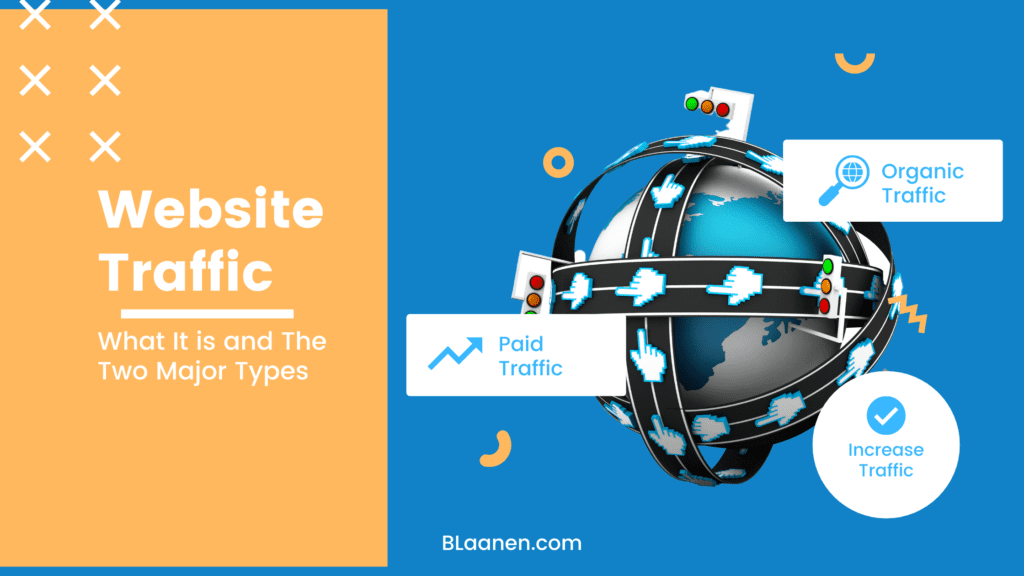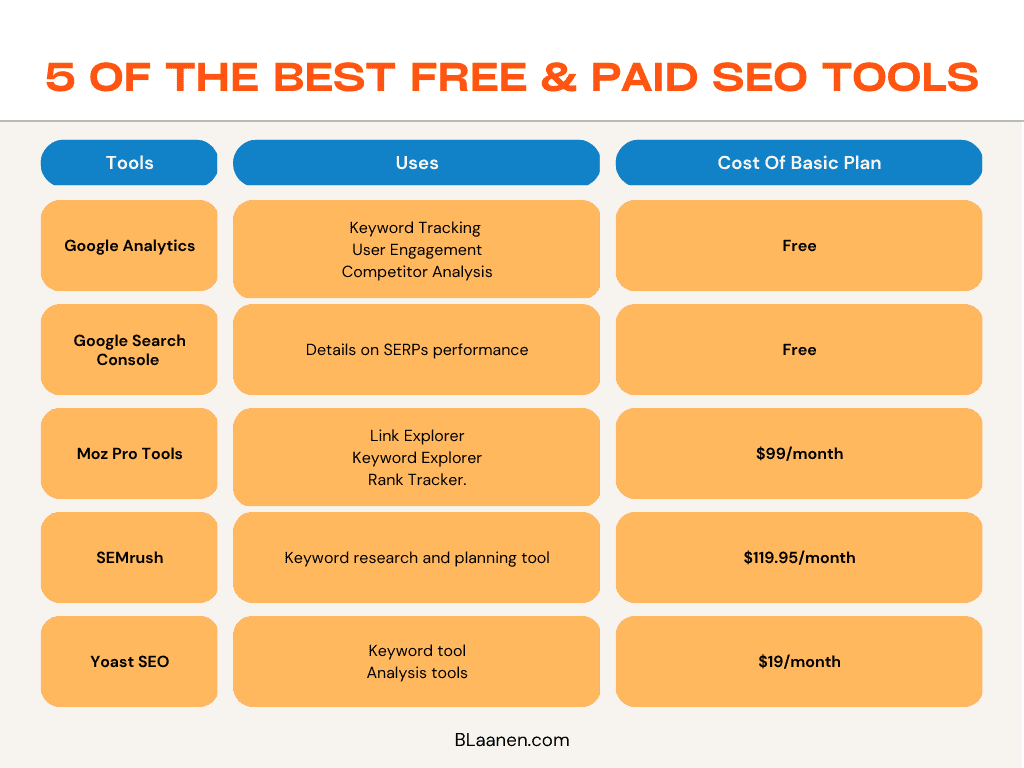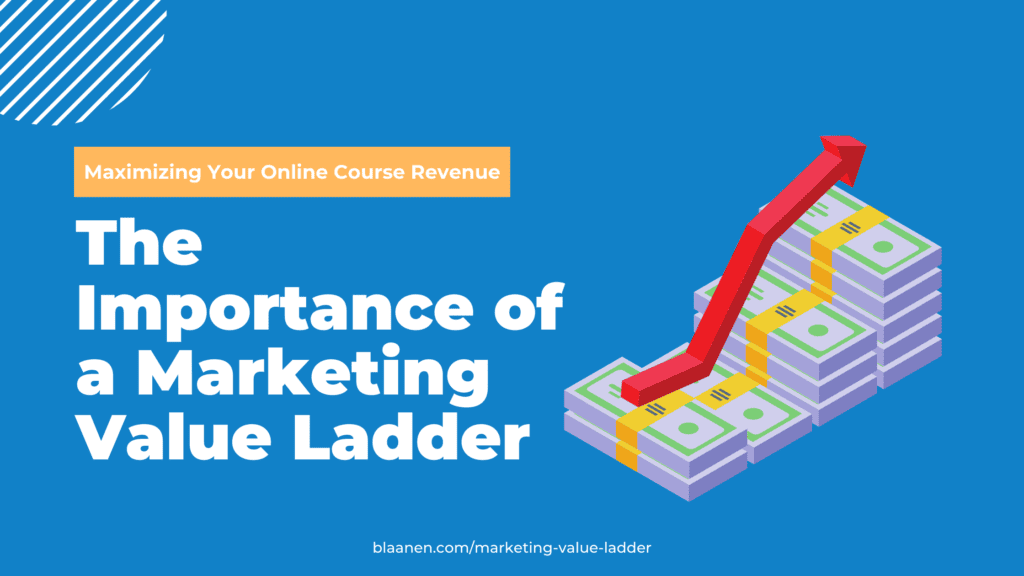It’s an established fact that you need search engine optimization (SEO) if you’re trying to supercharge the reach of your online course. But how exactly can you know if your search SEO efforts are paying off?
Strap in and get ready to take control! With a few key performance indicators (KPIs), you’ll have all the insights necessary to boost organic traffic and ensure your course is seen by as many eyes as possible.
In this blog post, we’ll break everything down. We’ll discuss website traffic, the best SEO practices to drive sales to your online course, and of course, SEO KPIs. SEO KPIs will allow measuring how well your optimization efforts are paying off.
Let’s dig deep into what’s possible when unlocking SEO success: let’s supercharge that reach!
Table of Contents
ToggleWebsite Traffic: What It Is and The Two Major Types

Before we look at SEO and what it can do for us, we need to understand website traffic. The major aim of SEO is to increase website traffic. Consequently, you need to know enough about web traffic to better optimize your content for search engines.
Website traffic is the number of people that visit your website or landing page. This can be broken down into two categories: organic and paid traffic. Organic traffic is the kind of web traffic that comes from SEO efforts. Paid traffic is the kind of web traffic generated by ads.
Websites that see a lot of traffic aren’t just lucky, they understand the importance of website traffic and how to maximize it.
More traffic to your website means more student sign-ups, which translates into more revenue. As a course creator, you’ll need to drive as much organic and paid traffic to your website as possible. Let’s take a look at both types of traffic.
Organic Traffic
Organic traffic is a key metric in the digital world. This website traffic comes from search engine results rather than paid advertising or links. Organic traffic is any website traffic derived from unpaid sources, such as search engine results pages (SERPs).
Online course creators need to understand organic traffic and its importance. It can help create content that increases visibility on Google and other search engines. You should also focus on organic if you’re trying to gain visibility that attracts potential learners.
Paid Traffic
As an online course creator, getting the word out about your courses is essential, and paid traffic is a reliable course of action. Paid traffic is a form of advertising – think of it as organic traffic’s wealthy cousin!
Paid traffic allows you to place ads on websites, social media platforms, and other digital channels to get more eyes on your courses. It’s an incredibly effective way of reaching people who may have yet to find you through SEO or organic traffic.
Besides its convenience, paid traffic offers many benefits that can help online course creators reach their goals. For instance, you can set up specific campaigns to target the right people and get more qualified leads.
What is SEO and Why It Matters to Rank Your Website and Sell Online Courses

Search engine optimization is used to optimize web pages to increase their visibility and ranking in search engines.
Using SEO, website owners can ensure that search engines properly index their pages. This helps them appear higher on relevant searches. Website owners can ensure their content has a high search visibility rating by optimizing webpages and content with keywords, titles, meta descriptions, and other elements.
SEO matters when ranking your website because it helps you get the most out of your online presence. With the proper optimization techniques, your website will be more visible during relevant searches. As a result, it will have a better chance of being seen by potential customers or clients. This increased visibility will lead to more traffic on your site. This means more sales opportunities for your online courses.
In addition to increasing visibility and traffic, SEO also helps improve the overall user experience of your website. Visitors who find what they need quickly on your site due to an optimized design and structure will be more likely to become students
Good SEO practices also help improve the credibility of any business or website—especially if you offer online courses as part of your business model.
In addition, a well-optimized site can give off a professional vibe that potential customers may find reassuring when deciding whether to purchase from you. In today’s competitive marketplaces, having an optimized website is critical for standing out from the competition.
5 Most Important SEO Practices for Online Course Creators

SEO can be a potent means for online course creators looking to increase their visibility and sales. Here are five of the most essential SEO practices you should focus on if you’re hoping to increase your revenue from your courses:
1. Optimize Your Page Titles
Page titles are one of the first things that appear when someone searches for something in Google, so it’s important to grab the reader’s attention. Make sure your titles are short but descriptive (around 60 characters is ideal), and include at least one or two primary keywords that relate to your content.
If you offer local services, make sure you use the right keywords for your local SEO. Go for any target keyword that will make it easy for the right people to find you. Using these guidelines will make content marketing easier for you.
2. Write Unique Descriptions
Writing unique descriptions is something that course creators or digital marketers must learn to do. Make sure each page has a unique meta description. This helps search engines understand your content and why somebody might want to click on it.
Aim for descriptions between 150-160 characters that give a brief overview of what readers can expect. Remember to use keywords naturally within the text where possible.
3. Use the Best Keywords
Keywords are one of the strongest tools available to course creators or digital marketers. You should not underestimate their power. Think of them as the “little words” that do big things. They are the engine that drives your course straight into potential buyers’ hearts and minds (and shopping carts).
The more relevant keywords you use in your title, descriptions, and content, the easier content marketing will be. Relevant keywords also increase your chances of appearing in search engine results. Improving your keyword rankings makes it much easier to reach your target audience. Don’t forget that more site visitors from Google (or any other search engine) search results in higher chances of organic conversions.
To maximize your reach, ensure you’re targeting the right keywords for your course. Keyword targeting can help track how well your online course performs and what areas need improvement.
- Generate Quality Backlinks
Backlinks help build authority and trust amongst potential customers, as they show that other sites consider yours valuable enough to link back to. This signals its quality and relevance to search engines such as Google.
Focus on building quality links from reputable sites rather than old ones. Some low-quality links may benefit your SEO efforts, but they must come from related sources or reliable directories.
You might also be interested in:
5. Use Search Snippets
Search snippets are an SEO tool used to help increase organic traffic and improve SEO KPIs. They are short pieces of content found at the top of search engine result pages (SERPs) that provide web users with a quick summary of a website’s information.
Search snippets can be crafted to stand out from other results and entice searchers to click the listing. By optimizing content for search snippets, website owners and SEO professionals can:
- Increase organic traffic to their page
- Reach more potential customers
- Show students that a particular course is what they need even before they click.
An effective search snippet should be enticing, informative, and accurate. When writing your search snippet, be sure to include the title of your course and a brief overview of what it offers.
Highlight any unique features or benefits that will make potential students want to learn more about your course. Use keywords relevant to your course, as this helps search engines understand what it is about.
Try to keep the overall length of your snippet under 160 characters. You should also use language that is natural and compelling. People should be able to read your search snippet and immediately understand what your course has to offer.
Think about the kinds of terms someone might use when searching for a course like yours, and make sure these words are included in the snippet. If you choose powerful words that accurately describe your course, you can help ensure that people find it easily online.
SEO Key Performance Indicators (KPIs): What They Are, and Which Ones Matter

SEO key performance indicators are the metrics that measure your marketing and search engine optimization efforts. SEO KPIs are used to measure and monitor your online content’s performance. They can include page views, organic traffic, bounce rate, backlinks, and more.
For example, let’s imagine you’re trying to increase your keyword rankings to get more organic traffic from search results. Your keyword performance is the metric you’ll use to measure whether or not your search engine optimization efforts are working.
Online course creators need to care about SEO KPIs because they help you understand how effectively your online content reaches its intended audience. By tracking your SEO KPIs, you can identify what topics and keywords resonate with your audience and which aren’t. This, in turn, allows you to refine your online content strategy to reach the right people more effectively.
SEO KPIs can also help online course creators understand how their courses perform compared to competitors. Try analyzing how your online content performs compared to competitors. This helps you gain valuable insights into their strategies and make adjustments to stay ahead of the competition.
12 Most Important SEO KPIs for Online Course Creators

SEO is essential for any online course creator looking to reach more people and increase their impact. To ensure that your website or course is visible in the SERPs, it’s important to track key performance indicators that measure success. Here are 12 of the most important KPIs to track any online course creator should focus on.
1. Backlinks
Backlinks are one of the most important SEO KPIs to track because they can significantly affect organic traffic and search engine ranking. They are links from other websites pointing back to yours – showing search engines that you have valuable and trustworthy content worth referencing from other sources.
The process of gaining more backlinks for your site is known as link building. Link building is easy for some large and popular sites because they are top in search results. As a course creator, you have to work for your links.
Try reaching out to other course creators with valuable content they may want to post on their sites so they’ll link to yours. You can even guest blog or share meaningful posts across social media, so more people see your post and link to your site.
Since link building is difficult, you may receive offers from people asking you to pay for links. You should know that Google is against buying backlinks to increase your page’s rank.
2. Organic Traffic
Monitoring organic traffic volume is essential since this traffic generally carries higher conversion rates than paid sources. This makes it much more valuable in terms of return on investment (ROI) potential.
With Google Search Console, you can:
- Gain insights into which keywords are driving organic traffic.
- Find out where customers may be coming from geographically
- Compare keyword rankings over time with competitor sites
This helps stay ahead of the curve in SEO strategy.
Organic traffic tells course creators how much traffic their website receives from organic SEO efforts. This can help them determine which SEO techniques are working and which need to be adjusted.
3. Keyword Rankings
Keyword rankings are among the most important SEO metrics because they attract organic conversions. They also make your course relevant on Google and other search engines. Keyword rankings are also a direct ranking factor and can show online course creators which SEO keywords their website is ranking for in search engine results.
If you target keywords that resonate with your target audience, you’re giving your content a good chance to reach students that need it.
Only the best web pages appear on the first search results page. You need to focus on this performance indicator if you’re trying to get organic or search traffic.
It’s important to track keyword rankings so that SEO efforts are focused on the most effective target keywords.
Tracking keyword rankings will help you know which keywords are bringing people to your site. They also help with tracking organic conversations will let you know your strategy and SEO ROI.
You can use tools like Moz Pro and SEMrush to gain insight into how well certain keywords are performing and competitor research. Competitor research and analysis are extremely important if you want to outdo the competition.
4. Social Shares
Social media is growing increasingly popular as a marketing medium. More and more social media posts are turning up on search engines, and almost every marketing or SEO strategy involves social media in some way. This is why social shares are important.
Social shares are important KPIs because they refer to people sharing links from your content on social media sites such as Twitter, Facebook, or Instagram. These shares give immediate exposure to larger audiences on those platforms and improve visibility in SERPs thanks to increased link authority signals from various worldwide networks linking to yours.
If you do not want to open a typical social media page for your business, consider LinkedIn or Google Business profile. LinkedIn is a business-focused social media and is useful for networking. Having a Google Business profile is also a good option as it places you on Google maps and positively impacts your business’s digital image and local SEO.
5. Click-through rate
Click-through rate is an important SEO KPI as it is directly associated with your revenue. CTR is related to SEO in how many people click-through from Search Engine Result Page to your website.
It’s the calculation of (how many clicks) divided by (how many times the website link is seen on the search engine results page). This SEO KPI tells online course creators how often visitors click on links within the website.
A higher click-through rate can indicate a successful SEO performance, as people engage with the content and take action.
6. Website visits
As an online course creator, you know that the success of your efforts depends on how many people visit your website. But how do you measure your website’s performance? That’s where website visit metrics come in! If you track your website visits, you’ll be able to monitor metrics such:
- Page speed
- Average session duration
- How well your target keywords are doing
Page speed showshow fast your website loads. A slow website will have people turning away faster than you can say “wait”. Likewise, average session duration shows how long people stay on your site at a stretch.
This can give you ideas on what your target audience likes and doesn’t like to help you improve your pages. You can even monitor the average session duration of your current students to give you an idea of how long your courses and posts should be. Website visits give insight to some of the most important KPIs which we will cover below.
7. Page Views
Page views are one of the most important SEO KPIs. They can tell you how many visitors have gone beyond your homepage and visited other pages within your site. In addition, tracking page views can help you understand:
- Which content resonates with visitors.
- Where they spend their time when visiting your site or taking a course.
Google Analytics makes it easy to monitor page views over time and compare them to other websites. This way, you can adjust your strategy as needed.
8. Bounce Rate
Bounce rate is an important SEO KPI that measures how many users visit one page of your site and then leave without taking any further action.
This metric can tell you if elements of your content or user experience need improvement to keep visitors engaged. Again, Google Analytics makes this easy to track SEO key metrics over time to make adjustments as necessary.
9. Unique visitors
Unique visitors are one of the most important SEO metrics because they show how many new people are visiting their website instead of returning visitors. This can help them determine if their SEO efforts reach a wider audience.
10. Exit pages
This metric tells online course creators which pages visitors exit the website from. This can help them pinpoint any SEO issues that need to be addressed.
11. Time on page
Time on page is one of the key SEO KPIs to track because it tells online course creators how long visitors spend on each website page. A longer time spent can indicate a positive SEO performance. A shorter time could indicate a need for SEO improvement.
12. Landing pages
This metric tells online course creators which pages visitors are landing on when they first visit their website. This helps them determine which SEO strategies are working and which need to be improved.
How to Decide Which SEO KPIs to Prioritize to Sell More Online Courses

As you’ve probably noticed, there are many key performance indicators, which can be a bit overwhelming. The good news is that you do not need to focus on them simultaneously as a course creator. Here is a guide to help you decide what SEO KPIs to prioritize.
Determine Which SEO KPIs Will Give You the Best Return on Your Investment
First and foremost, you need to determine which SEO KPIs will give you the best return on your investment. Certain SEO KPIs may be more beneficial than others depending on the type of online course you’re selling.
For instance, if most of your sales come from organic search traffic, try focusing on increasing organic search rankings and getting higher click-through rates (CTR).
Quality over Quantity
When assessing your current SEO KPIs, it’s important to remember that not all metrics are created equal. For example, you may have an impressive number of backlinks, but if most are low-quality links, they won’t be nearly as effective at helping you sell courses as high-quality backlinks would be.
It’s also important to measure multiple key metrics over time instead of relying solely on one metric such as CTR or page views per visitor. This will enable you to track progress more accurately and make adjustments accordingly.
Focus on User Experience
Additionally, when choosing which SEO KPIs to prioritize for your online course sales efforts, focusing on user experience first and foremost can be helpful. If people find navigating your website difficult or cannot find what they need quickly, they won’t be likely to purchase a course from you. A bad website will lose customers even though the product is good.
Try to optimize for conversions rather than sheer numbers such as CTRs or pageviews. You can ensure that landing pages are optimized for conversion rates.
By properly assessing the various SEO KPIs you can significantly increase the number of sales generated through organic search traffic. If you prioritize those that bring the highest return on investment while optimizing user experience, you’ll increase customer satisfaction.
5 of the Best Free SEO Tools for Online Course Creators

Monitoring and analyzing SEO KPIs for your online course can be confusing if you attempt to do it manually. Luckily, there are a bunch of tools you can use to improve your search visibility and your general SEO performance.
You can also track your ranking on search engine results pages and even keyword rankings on specific keywords. These tools can also help you track SEO KPIs that matter to your brand. Let’s get started.

1. Google Analytics
Google Analytics is an essential tool for any online course creator trying to track SEO KPIs. It allows them to track the performance of their courses and make adjustments as needed. With Analytics, you can monitor multiple SEO KPIs, such as user engagement, and identify which keywords bring valuable traffic to your site.
Analytics can also help you understand how well your content is doing in search engine results pages (SERPs). Here are just some of the reasons why analytics are so important for online course creators:
- Keyword Tracking: Google Analytics allows you to track which keywords are bringing people to your site and see how they perform in terms of clicks and conversions. Having a Google Analytics account makes it easy to identify which words and phrases have the potential for improved rankings. This allows you to optimize your content accordingly.
- User Engagement: Analytics also lets you measure user engagement with your course. You’ll be able to see which lessons or topics are being visited and determine if there are any areas where you need to improve content or instruction. This helps you keep users on-site longer.
- Competitor Analysis: It’s also possible to use analytics data to get an idea of competitors’ tactics and analyze their performance compared with yours. This will give you valuable insights into what works best regarding SEO strategy.
By taking advantage of all that Google Analytics offers, online course creators can easily improve their content visibility and increase student engagement. This ensures that their curriculum reaches the widest possible audience.
Besides being able to monitor any key performance indicator you’re after, Google analytics makes it easier to prepare and view a performance report. If you do not already have a Google Analytics account, you’ll be pleased to know that you can sign up for free!
2. Google Search Console
Google’s search console provides detailed information and insights into your site or online course’s performance in the SERPs. This tool makes it easy to understand:
- Which keywords your content is ranking for.
- What pages need improvement.
- Where your site needs to focus its efforts to achieve better rankings.
3. Moz Pro Tools
Moz Pro offers a comprehensive suite of SEO analytics tools to help you:
- Find and optimize keyword opportunities.
- Track changes on your or competitors’ sites
- Monitor backlinks.
- Analyze content performance.
It also has an extensive collection of resources for learning about all aspects of SEO.
4. SEMrush
SEMrush is another powerful suite of SEO tools that includes keyword research, competitive analysis, backlink monitoring, and more. The tool helps you identify keywords with high potential for improved rankings as well as competitor tactics, so you can stay ahead of the curve with your SEO strategy.
5. Yoast SEO
Yoast SEO offers a great WordPress plugin that can help optimize pages on your course website for keywords and phrases while providing helpful tips. This makes it easier than ever to ensure that each page on your site is optimized for maximum visibility in organic search results.
Final Thoughts
If all this search engine optimization talk makes you feel lost, that’s understandable. But don’t worry, We’re here to help. We have plenty of resources on our site to get you started on your SEO journey. So what are you waiting for? Get reading and start supercharging your reach today!



